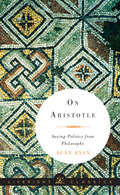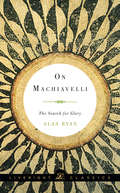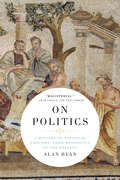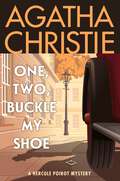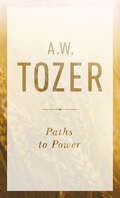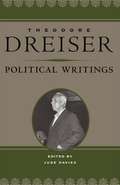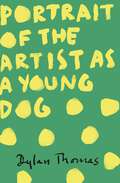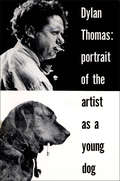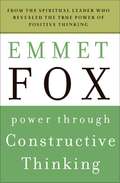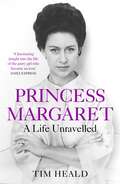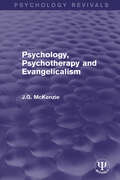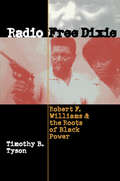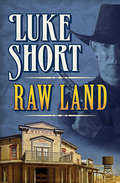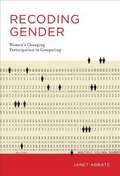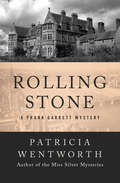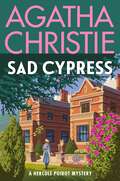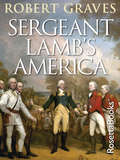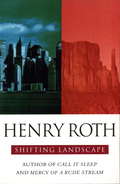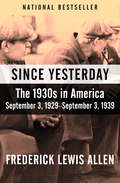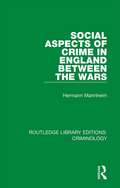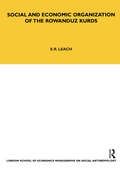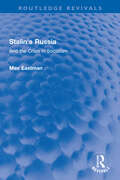- Table View
- List View
On Aristotle: Saving Politics from Philosophy (Liveright Classics)
by Alan RyanAn essential, comprehensive, and accessible guide to the life and works of Aristotle. In On Aristotle: Saving Politics from Philosophy, Alan Ryan examines Plato's most famous student and sharpest critic, whose writing has helped shape over two millennia of Western philosophy, science, and religion. The first thinker to posit that a society should be ruled by laws and not men, Aristotle was born in Stagira, Macedon, in 384 BCE. He would go on to join Plato's Academy and eventually become tutor to Alexander the Great. During his lifetime he would see the revival of Athens following its destruction in the Peloponnesian War, before the ultimate extinction of its radical form of democracy after the Macedonian conquest. Aristotle's strongly empirical cast of mind was brought to bear on a stunning range of subjects, from rhetoric to physics, from the history of political institutions and mathematics to zoology and botany. The resulting system dominated European thought from the thirteenth to seventeenth centuries. In Nicomachean Ethics and Politics--both excerpted here--Aristotle attempted to delineate the ideal virtues of a both public and private life as well as critique the utopian antipolitics of his former teacher, Plato. For Aristotle, life in a polis was the natural state of man and provided the greatest opportunity for human beings to fulfill their potential. Unlike his scientific theories, which would eventually be displaced by Galileo, Newton, and Darwin, Aristotle's meticulous thinking on the nature of human affairs, ethics, politics, citizenship, and virtue in a civil society remains as vital today as it was in his own time.
On Machiavelli: The Search for Glory (Liveright Classics)
by Alan RyanAn essential, comprehensive, and accessible guide to the life and works of Machiavelli. In On Machiavelli: The Search for Glory, Alan Ryan illuminates the political and philosophical complexities of the often-reviled godfather of realpolitik. Thought by some to be the founder of Italian nationalism, regarded by others to be a reviver of the Roman Republic as a model for the modern Western world, Machiavelli remains a contentious figure. Often outraging popular opinion with his insistence on the amoral nature of power, Machiavelli eschewed the world as it ought to be in favor of a forthright appraisal of the one that is. Perhaps more than any other thinker, Machiavelli has suffered from being taken out of context, and Ryan places him squarely within his own time and the politics of a Renaissance Italy riven by near-constant warfare among rival city-states and the papacy. A well-educated son of Florence, Machiavelli was originally in charge of the Florentine Republic's militia, but in 1512 the city fell to papal forces led by Cardinal Giovanni de Medici, who thus restored the Medici family to power. Machiavelli was accused of conspiracy, imprisoned, tortured, and eventually exiled from his beloved Florence, and it was during this period that he produced his most famous works. While attempting to ingratiate himself to the Medicis, the historically minded Machiavelli looked to the imperial ambitions and past glories of the Roman Republic as a contrast to the perceived failures of his contemporaries. For Machiavelli, the hunger for power and glory was inextricable from human nature, and any serious attempt to rule must take this into account. In his revolutionary The Prince and Discourses--both excerpted here--Machiavelli created the first truly modern analysis of power.
On Politics: From Herodotus to the Present (Liveright Classics Ser. #0)
by Alan RyanThree decades in the making, one of the most ambitious and comprehensive histories of political philosophy in nearly a century. Both a history and an examination of human thought and behavior spanning three thousand years, On Politics thrillingly traces the origins of political philosophy from the ancient Greeks to Machiavelli in Book I and from Hobbes to the present age in Book II. Whether examining Lord Acton's dictum that "absolute power corrupts absolutely" or explicating John Stuart Mill's contention that it is "better to be a human dissatisfied than a pig satisfied," Alan Ryan evokes the lives and minds of our greatest thinkers in a way that makes reading about them a transcendent experience. Whether writing about Plato or Augustine, de Toqueville or Thomas Jefferson, Ryan brings a wisdom to his text that illuminates John Dewey's belief that the role of philosophy is less to see truth than to enhance experience. With this unparalleled tour de force, Ryan emerges in his own right as one of the most influential political philosophers of our time.
One, Two, Buckle my Shoe: A Hercule Poirot Mystery (Hercule Poirot Mysteries #22)
by Agatha ChristieThe meticulous detective Hercule Poirot suspects the worst of the death of a dentist in this classic mystery by Queen of Whodunits, Agatha Christie.Even the great detective Hercule Poirot harbored a deep and abiding fear of the dentist, so it was with some trepidation that he arrived at the celebrated Dr. Morley’s surgery for a dental examination. But what neither of them knew was that only hours later Poirot would be back to examine the dentist, found dead in his own surgery.Turning to the other patients for answers, Poirot finds other, darker, questions.…
Paths to Power: Living in the Spirit's Fullness
by A. W. TozerThe church that lacks power first lacks obedience. Speaking of apathy toward obedience, A. W. Tozer says, "Until this is corrected, we can hope for very little power in our churches…&” Obedience is what no revival, no reformation, and no Spirit-filled person has ever been without. It separates true faith from dead faith.It bears fruit and is followed by power. It is costly, but we cannot afford to withhold it.Paths to Power points Christians and churches to the age-old way of obedience, the only road to revival.Delivering a charge to weak churches, A. W. Tozer calls us to rise up, gather the wood, and ascend the mountain. Abraham believed God, and it was credited to him as righteousness. But His belief cost him something. Does ours?
Paths to Power: Living in the Spirit's Fullness
by A. W. TozerThe church that lacks power first lacks obedience. Speaking of apathy toward obedience, A. W. Tozer says, "Until this is corrected, we can hope for very little power in our churches…&” Obedience is what no revival, no reformation, and no Spirit-filled person has ever been without. It separates true faith from dead faith.It bears fruit and is followed by power. It is costly, but we cannot afford to withhold it.Paths to Power points Christians and churches to the age-old way of obedience, the only road to revival.Delivering a charge to weak churches, A. W. Tozer calls us to rise up, gather the wood, and ascend the mountain. Abraham believed God, and it was credited to him as righteousness. But His belief cost him something. Does ours?
Political Writings
by Theodore DreiserTheodore Dreiser staked his reputation on fearless expression in his fiction, but he never was more outspoken than when writing about American politics. Spanning a period in American history from the Progressive Era to the advent of the Cold War, this generous volume collects Dreiser's most important political writings from his journalism, broadsides, speeches, private papers, and long out-of-print nonfiction books. Touching on the Great Depression, the New Deal, and both World Wars as well as Soviet Russia and the persecution of Jews in Nazi Germany, these writings exemplify Dreiser's candor and his penchant for championing the defenseless and railing against corruption. The works also navigate historical terrain with prescient observations on topics such as religion, civil rights, national responsibility, individual ethics, global relations, and censorship that remain relevant to a contemporary audience.
Portrait Of The Artist As A Young Dog
by Dylan ThomasFirst the young schoolboy, gloriously immersed in make-believe in a shabby farmyard; then the budding poet with his thrilling friendships and dreams of fortune. Finally, the neophyte reporter roaming suburban Swansea for momentous material. In ten wonderfully evocative short stories, Dylan Thomas conveys the exuberance and enthusiasm of youth as he fictionalises events from his childhood. Adolescent sexuality and male friendship are two of the themes that pervade this collection, along with the more familiar topics of love, death and religion.Featuring a bold new livery in celebration of the Dylan Thomas centenary.
Portrait of the Artist as a Young Dog: Stories
by Dylan ThomasThe "Young Dog" of the title is of course Thomas himself, and this volume of autobiographical stories by the great modern poet, who died at 39 while on his third lecture tour in the United States, shows his waggish humor at its best, his exuberance and verbal magic in spectacular display. It also shows him a spinner of tales and a creator of memorable characters. There is the grandfather who marches off in his best clothes to be buried in the next town, the sardonic "senior reporter" on a provincial newspaper, servant girls who know how to deal triumphantly with a fast-talking dandy, a twenty-year-old farmer preaching wildly to boys in a deserted barn, a group of respectable worthies who play at literature behind closed blinds, and always the observant and unfazed young Thomas. Few writers have evoked as successfully the mysteries and adventures of boyhood, of young love with its shattered dreams, or of death haunting two lads at play: none has done it in as fresh and telling phrases, with an elation as natural and contagious.
Power Through Constructive Thinking
by Emmet FoxOne of the First Books to Demonstrate the Power of Positive Thoughts Fresh with contemporary relevance, this classic of positive thinking from one of the world's greatest motivational writers offers stirring insights on self-transformation. Based on Emmet Fox's simple message that "thoughts are things" and all potential rests in their creative and constructive use, these thirty-one inspiring essays show how to have it all--health, success, happiness, and a liberated spirit--through the power of constructive thought. First published in 1940, Power Through Constructive Thinking has been a never-failing source of strength and renewal for generations of readers.
Power Through Constructive Thinking
by Emmet FoxOne of the First Books to Demonstrate the Power of Positive ThoughtsFresh with contemporary relevance, this classic of positive thinking from one of the world's greatest motivational writers offers stirring insights on self-transformation. Based on Emmet Fox's simple message that "thoughts are things" and all potential rests in their creative and constructive use, these thirty-one inspiring essays show how to have it all--health, success, happiness, and a liberated spirit--through the power of constructive thought. First published in 1940, Power Through Constructive Thinking has been a never-failing source of strength and renewal for generations of readers.
Princess Margaret: A Life Unravelled
by Tim HealdElegant and sophisticated biography of Princess Margaret, the controversial sister of Queen Elizabeth II, the Princess Diana of her day'A fascinating insight into the life of the party girl who became an icon in postwar Britain' DAILY EXPRESS'She was a witty, intelligent, stimulating companion - happily Tim Heald captures all these qualities in his admirably well-balanced biography' LITERARY REVIEWThe almost universal conception is that the life of Princess Margaret (1930-2002) was a tragic failure, a history of unfulfilment.Tim Heald's vivid and elegant biography portrays a woman who was beautiful and sexually alluring - even more so than Princess Diana, years later - and whose reputation for naughtiness co-existed with the glamour. The mythology is that Margaret's life was 'ruined' by her not being allowed to marry the one true love of her life - Group Captain Peter Townsend - and that therefore her marriage to Lord Snowdon and her well-attested relationships with Roddy Llewellyn and others were mere consolation prizes. Margaret's often exotic personal life in places like Mustique is a key part of her story. The author has had extraordinary help from those closest to Princess Margaret, including her family (Lord Snowdon and her son, Lord Linley), as well as three of her private secretaries and many of her ladies in waiting. These individuals have not talked to any previous biographer. He has also had the Queen's permission to use the royal archives.Heald asks why one of the most famous and loved little girls in the world, who became a juvenile wartime sweetheart, ended her life a sad wheelchair-bound figure, publicly reviled and ignored. This is a story of a life in which the private and the public seemed permanently in conflict. The biography is packed with good stories. Princess Margaret was never ignored; what she said and did has been remembered and recounted to Tim Heald.
Princess Margaret: A Life Unravelled
by Tim HealdElegant and sophisticated biography of Princess Margaret, the controversial sister of Queen Elizabeth II, the Princess Diana of her day'A fascinating insight into the life of the party girl who became an icon in postwar Britain' DAILY EXPRESS'She was a witty, intelligent, stimulating companion - happily Tim Heald captures all these qualities in his admirably well-balanced biography' LITERARY REVIEWThe almost universal conception is that the life of Princess Margaret (1930-2002) was a tragic failure, a history of unfulfilment.Tim Heald's vivid and elegant biography portrays a woman who was beautiful and sexually alluring - even more so than Princess Diana, years later - and whose reputation for naughtiness co-existed with the glamour. The mythology is that Margaret's life was 'ruined' by her not being allowed to marry the one true love of her life - Group Captain Peter Townsend - and that therefore her marriage to Lord Snowdon and her well-attested relationships with Roddy Llewellyn and others were mere consolation prizes. Margaret's often exotic personal life in places like Mustique is a key part of her story. The author has had extraordinary help from those closest to Princess Margaret, including her family (Lord Snowdon and her son, Lord Linley), as well as three of her private secretaries and many of her ladies in waiting. These individuals have not talked to any previous biographer. He has also had the Queen's permission to use the royal archives.Heald asks why one of the most famous and loved little girls in the world, who became a juvenile wartime sweetheart, ended her life a sad wheelchair-bound figure, publicly reviled and ignored. This is a story of a life in which the private and the public seemed permanently in conflict. The biography is packed with good stories. Princess Margaret was never ignored; what she said and did has been remembered and recounted to Tim Heald.
Psychology, Psychotherapy and Evangelicalism (Psychology Revivals)
by J.G. McKenzieOriginally published in 1940, this is a contribution to the better understanding of Evangelical experience and doctrine. It is the author’s belief that the application of psychology to religion in general can make little or no further advance except through the study of particular types of religious experience. The various psychotherapeutic techniques provide the means for such a study, and in this volume they are applied to Evangelicalism. At first the author attempts to justify this application to Evangelical experience and doctrine, and outlines what he believes to be the essence of Evangelicalism. Part 2 of the book begins the contribution proper with an attempt to get a clear view of conscience and proceeds to salvation and its problems: conversion, guilt, sin, forgiveness, atonement. Part 3 deals with Evangelical experience and doctrine and the spiritual life of the Evangelical, and concludes with some general applications of psychology to Church work.
Radio Free Dixie
by Timothy B. TysonThis book tells the remarkable story of Robert F. Williams--one of the most influential black activists of the generation that toppled Jim Crow and forever altered the arc of American history. In the late 1950s, as president of the Monroe, North Carolina, branch of the NAACP, Williams and his followers used machine guns, dynamite, and Molotov cocktails to confront Klan terrorists. Advocating "armed self-reliance" by blacks, Williams challenged not only white supremacists but also Martin Luther King Jr. and the civil rights establishment. Forced to flee during the 1960s to Cuba--where he broadcast "Radio Free Dixie," a program of black politics and music that could be heard as far away as Los Angeles and New York City--and then China, Williams remained a controversial figure for the rest of his life. Historians have customarily portrayed the civil rights movement as a nonviolent call on America's conscience--and the subsequent rise of Black Power as a violent repudiation of the civil rights dream. But Radio Free Dixie reveals that both movements grew out of the same soil, confronted the same predicaments, and reflected the same quest for African American freedom. As Robert Williams's story demonstrates, independent black political action, black cultural pride, and armed self-reliance operated in the South in tension and in tandem with legal efforts and nonviolent protest."Stunning. . . . Radio Free Dixie presents an engaging portrait of one man's continuous struggle to resist political and social oppression."--Emerge"[A] radiant biography. . . . Tyson is that rarest of writers: a successful scholar who can actually tell a compelling story in clear, even handsome language."--Village Voice Literary Supplement"Tyson's firecracker text crackles with brilliant and lasting images of black life . . . across the South in the '40s, '50s and '60s. . . . Tyson successfully portrays Williams as a troubled visionary, a strong, stubborn and imperfect man, one who greatly influenced what became the Black Power Movement and its young leaders."--Publishers WeeklyThis book tells the riveting story of controversial black activist Robert F. Williams (1925-1996). In the late 1950s, as president of the Monroe, North Carolina, NAACP, Williams organized armed resistance to KKK terrorists--in the process challenging not only white supremacists but also Martin Luther King Jr. and the civil rights establishment. As Radio Free Dixie reveals, however, the civil rights movement and the Black Power movement grew out of the same soil, confronted the same predicaments, and were much closer than traditional portrayals suggest. In the civil rights-era South, independent black politics, black cultural pride, and "armed self-reliance" operated in tension and in tandem with legal efforts and nonviolent protests in the quest for African American freedom. -->
Raw Land
by Luke ShortA hard-riding adventurer returns home to settle down—and stirs up a heap of trouble—in this action-packed western from a master of the genre. After ten years of hard fighting and harder living, Will Danning is coming home to Yellow Jacket. His arrival is anything but celebrated, however—the last time he cast a shadow here, he wasn&’t exactly walking the straight and narrow. Danning has returned to buy the Pitchfork Ranch, where he used to work cattle that weren&’t always legally his. For his neighbors, that&’s cause for concern; Angus Case still remembers when his herds were ravaged. What&’s more, Danning&’s friends can&’t understand why he&’d want such a dried-up parcel of land. And Pres Milo, Case&’s chief ramrod and enforcer, wants the land for himself—and will do anything to get it. If Danning wants to keep what&’s his, he&’ll have to fight. And in a frontier town like Yellow Jacket, fighting often means dying . . . A legend of western fiction, Luke Short blazed the trail for writers such as Louis L&’Amour and Elmore Leonard. Raw Land is one of his grittiest and most authentic tales of frontier adventure.
Recoding Gender
by Janet AbbateToday, women earn a relatively low percentage of computer science degrees and hold proportionately few technical computing jobs. Meanwhile, the stereotype of the male "computer geek" seems to be everywhere in popular culture. Few people know that women were a significant presence in the early decades of computing in both the United States and Britain. Indeed, programming in postwar years was considered woman's work (perhaps in contrast to the more manly task of building the computers themselves). In Recoding Gender, Janet Abbate explores the untold history of women in computer science and programming from the Second World War to the late twentieth century. Demonstrating how gender has shaped the culture of computing, she offers a valuable historical perspective on today's concerns over women's underrepresentation in the field. Abbate describes the experiences of women who worked with the earliest electronic digital computers: Colossus, the wartime codebreaking computer at Bletchley Park outside London, and the American ENIAC, developed to calculate ballistics. She examines postwar methods for recruiting programmers, and the 1960s redefinition of programming as the more masculine "software engineering." She describes the social and business innovations of two early software entrepreneurs, Elsie Shutt and Stephanie Shirley; and she examines the career paths of women in academic computer science. Abbate's account of the bold and creative strategies of women who loved computing work, excelled at it, and forged successful careers will provide inspiration for those working to change gendered computing culture.
Rolling Stone: A Frank Garrett Mystery (The Frank Garrett Mysteries #2)
by Patricia WentworthA Foreign Office agent assumes a dead man&’s identity to infiltrate an international ring of thieves, blackmailers, and murderers Peter Talbot is in Brussels tailing a dangerous con man when the opportunity of a lifetime falls in his lap. His quarry dies, leaving behind a suitcase filled with money, coded messages, a passport, and a cryptic letter about a woman named Maud Millicent Simpson. Reborn as Spike Reilly—a.k.a. James Peter Reilly—a.k.a. Pierre Riel—Talbot follows a twisting trail that leads the undercover operative to an English country estate and into a deadly conspiracy of robbery and murder. Meanwhile, in London, Talbot&’s uncle, Col. Frank Garrett, is probing a string of purloined masterpieces—the latest stolen from the Louvre. Scotland Yard flummoxed, it falls to the Foreign Office to bring the culprits to justice. As the parallel investigations converge, Garrett and his nephew match wits with a cunning and beautiful criminal who&’s a brilliant master of disguise. And soon an innocent woman&’s life is in danger. Patricia Wentworth, author of the Miss Silver Mysteries, combines &“adventure, romance, and mystery&” (Kirkus Reviews) in this stunning crime novel. Rolling Stone is the 2nd book in the Frank Garrett Mysteries, but you may enjoy reading the series in any order.
Sad Cypress: A Hercule Poirot Mystery: The Official Authorized Edition (Hercule Poirot Mysteries #20)
by Agatha ChristieIn Agatha Christie’s classic murder mystery Sad Cypress, a woman damned by overwhelming evidence stands accused of murdering her romantic rival, and only Hercule Poirot stands between her and the gallows.Beautiful young Elinor Carlisle stood serenely in the dock, accused of the murder of Mary Gerrard, her rival in love. The evidence was damning: only Elinor had the motive, the opportunity, and the means to administer the fatal poison.Yet, inside the hostile courtroom, only one man still presumed Elinor was innocent until proven guilty. Hercule Poirot was all that stood between Elinor and the gallows.…
Sergeant Lamb's America
by Robert GravesThe author of I, Claudius &“recounts, in faithful and nicely atmospheric detail&” the story of a British soldier during the American Revolution (The Philadelphia Inquirer). The first in a two-book series, Sergeant Lamb&’s America tells the story of Sgt. Roger Lamb, an Irish soldier who served on the British side during the American War of Independence. Based on real historical events and people, Sergeant Lamb recounts the British defeat and the capture of his unit at the Battle of Saratoga in a voice that&’s both funny, insightful, and wise. This fictionalized account is based on the journals of the historical Sergeant Roger Lamb, and is largely faithful to the true eyewitness account of the American Revolution told from the loser&’s perspective. With his engaging, personable voice and basic decency of character, Sergeant Lamb reminds us that regardless of how history casts the British side, there were good men on both sides of this important conflict. &“It is a historical novel for which one has a very real respect.&” —The New York Times
Shifting Landscapes
by Henry RothThis book collects all of Henry Roth's published writings, other than Call it Sleep, Mercy of a Rude Stream and A Diving Rock on the Hudson, into one major body of work, spanning a period that beings in 1925 and ends in 1987. The thirty-one pieces include all of Roth's short stories, the only remaining chapter of the unfinished second novel that he wrote for Maxwell Perkins (and later burned), and other articles and memoir materials.Edited with and introduction by Mario Materassi, the distinguished Italian translator and Roth's longtime friend, the book contains writings that have appeared in such well-known publications as the Atlantic, Commentary and The New Yorker, as well as in small magazines and periodicals long since defunct. For any reader who has been held spellbound by the sheer lyrical power and psychological brilliance of Roth's novels, Shifting Landscape is essential reader - for within its melodic stories we gain insight into the reasons for Roth's legendary sixty-year writer's block and discern the first intimations of the literary renaissance that has become Roth's in the 1990's.
Since Yesterday: The 1930s in America, September 3, 1929–September 3, 1939
by Frederick Lewis AllenHeralded by the New York Times as "a shrewd, concise, wonderfully written account of America in the '30s . . . a reminder of why history matters," the bestselling sequel to Only Yesterday illuminates the events that brought America back from the brink Published in 1940, Since Yesterday takes up where Lewis's classic leaves off. Opening on September 3, 1929, in the days before the stock market crash, this information-packed volume takes us through one of America's darkest times all the way to the light at the end of the tunnel. Following Black Tuesday, America plunged into the Great Depression. Panic and fear gripped the nation. Banks were closing everywhere. In some cities, 84 percent of the population was unemployed and starving. When Franklin D. Roosevelt took office in 1933, public confidence in the nation slowly began to grow, and by 1936, the industrial average, which had plummeted in 1929 from 125 to fifty-eight, had risen again to almost one hundred. But America still had a long road ahead. Popular historian Frederick Lewis Allen brings to life these ten critical years. With wit and empathy, he draws a devastating economic picture of small businesses swallowed up by large corporations--a ruthless bottom line not so different from what we see today. Allen also chronicles the decade's lighter side: the fashions, morals, sports, and candid cameras that were revolutionizing Americans' lives. From the Lindbergh kidnapping to the New Deal, from the devastating dust storms that raged through our farmlands to the rise of Benny Goodman, the public adoration of Shirley Temple, and our mass escape to the movies, this book is a hopeful and powerful reminder of why history matters.
Social Aspects of Crime in England between the Wars (Routledge Library Editions: Criminology)
by Hermann MannheimOriginally published in 1940. This ground-breaking work formed the foundation for modern criminology becoming an academic discipline within UK sociological studies. It concerns the history of crime, its causes and treatment in England during the preceding twenty-five years or so. Mannheim, through this and later studies, went on to found the criminology department at LSE. The book offers an evaluation of the criminological implications of the War and early post-War period as well as an examination of the practical working of the new penal machinery built up by the Reform Acts passed just prior to the War. The author produced a scientific account of the post-War state of crime, beginning with a critical examination of the structure and interpretation of English Criminal Statistics followed by a survey of the principal criminological features of the period between the two Wars. Significant aspects are dealt with in a separate chapters - four devoted to problems of work and leisure (Unemployment and Strikes, Business Administration, Alcoholism, and Gambling), four others to those of certain specific sections of the population (Juvenile Delinquency, Female Delinquency and Prostitution, Recidivism). This is a fascinating read for both the historian and the criminologist.
Social and Economic Organization of the Rowanduz Kurds
by Edmund LeachInitially published in 1940, the following account is based upon a five weeks field survey carried out during the summer of 1938 in Iraq. The author intended to follow this up with an intensive study of one locality over a period of twelve months. Political developments in Europe made this project impracticable at the time and the scheme was abandoned.
Stalin's Russia: And the Crisis in Socialism (Routledge Revivals)
by Max EastmanFirst published in 1940, Stalin’s Russia is a close study of the development of the Stalinist regime and the flaws in socialist doctrine that made it possible. The book examines the contrasts between the "free and equal" society heralded by the Marxist-Leninist programme and the totalitarian state that emerged in its place. It makes use of a wealth of material to cast light on the inner workings of Stalin’s regime. It explores the significance of the Stalin-Hitler pact, and argues that the word "socialism" itself became a liability to any genuine movement of liberation as a result.
